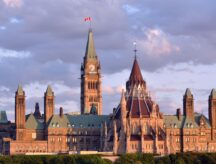Canadian Immigration History – Government of Canada Addressing Past Wrongs
Over the past couple of years, the Government of Canada has been taking steps to address past injustices to Chinese Canadians, Indo-Canadians and other ethnic communities – “actions related to immigration restrictions and wartime measures, which, although legal at the time, are considered to be inconsistent with the values that Canadians hold today.”
The current Canadian federal government is now taking responsibility for some of the less positive aspects of Canadian immigration history. Consultations with various ethno-cultural groups seeking redress for past wrongs have been progressing and the new terms and conditions of the Community Historical Recognition Program (CHRP) are being finalized. Agreements have already been reached with some ethno-cultural communities and apologies and symbolic payments to survivors of the long-ago policies have been made. “All you can do as a government is demonstrate though meaningful symbolic actions, serious regret for what happened in the past,” explains Jason Kenney, secretary of state for multicultural and Canadian identity.
One of the Canadian government’s focuses in these consultations is the Indo-Canadian community and the Komagata Maru ship incident of 1914. The incident, for which Indo-Canadians have long been seeking a formal apology, saw over 350 Sikhs, Muslims, and Hindus forced back to sea from a Vancouver harbour, after having been detained in the ship with little food for over a month. The British Columbia Court of Appeal administered the deportation order based on the existing law that immigrants who had not traveled directly from their country of origin were prohibited from landing in Canada. As ships could not manage a direct passage from India to Canada at the time, the law was perceived as discriminatory.
In a speech made by Prime Minister Stephen Harper in August 2006, he stated that “the government of Canada acknowledges the Komagata Maru incident and [will] soon undertake consultations with the Indo-Canadian community on how best to recognize this sad moment in [Canada’s] history.” Since that time, meetings and town hall gatherings have been held in Toronto and Vancouver with representation from the different religions and different segments of the Indo-Canadian community. Seeking to facilitate intra-community dialogue, solicit the views of Indo-Canadians, and provide a degree of healing and closure, the meetings reinforced the Canadian government’s commitment to the community. A report was prepared for the Minister of Canadian Heritage with suggestions about how to commemorate the incident as well as the impacts of Indian migration to Canada. The government is currently deliberating over an action plan for redress to the Indo-Canadian community.
Indian troops first visited Canada on their way back from Queen Victoria’s Diamond Jubilee in 1897. Back in India they described a country waiting to be settled by British subjects like themselves, and migration from India to Canada began. The past 40 years have seen the most concentrated immigration, as hundreds of thousands of people from the Indian subcontinent have chosen to make Canada their home. India remains a top source country for Canadian immigration, under the Federal Skilled Worker Program. The present Indo-Canadian population is about three quarters of a million.
- Do you need Canadian immigration assistance? Contact the Contact Cohen Immigration Law firm by completing our form
- Send us your feedback or your non-legal assistance questions by emailing us at media@canadavisa.com



